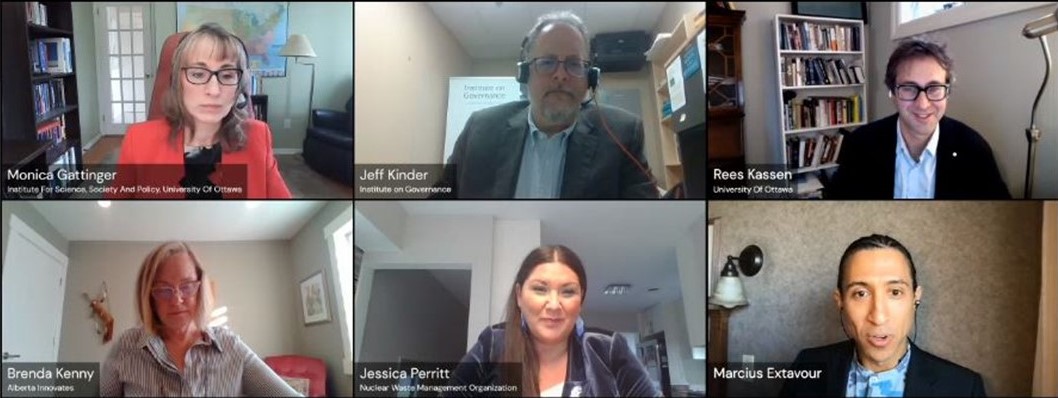Blog post by Jessica Perritt, Section Manager, Indigenous Knowledge & Reconciliation at the NWMO. Originally published in the University of Ottawa's Institute for Science, Society and Policy News.
Recently, the Institute for Science, Society and Policy (ISSP) organized a panel entitled Mission-Driven Research and Innovation to Address Grand Challenges: Does Canada have what it takes? at the Canadian Science Policy Conference.
We need to understand that Indigenous voice is important in all mission-driven projects. If we make that space for Indigenous voices in the creation of missions, it broadly serves society as a whole and the economy as a whole.
In doing that, we have to create space for Indigenous knowledge. At the Nuclear Waste Management Organization (NWMO), my work is to bridge western ways of knowing and Indigenous ways of knowing. Building that bridge together ultimately makes our project and our work better.
There are a number of misconceptions about what Indigenous Knowledge is. It is oftentimes seen as knowledge of the land—where people pick medicine, where foods grow, where animals are migrating—when in fact, Indigenous knowledge is a very rich and sophisticated knowledge system inclusive of governance, research and science. In creating space for mission-driven research, we have to make sure that Indigenous knowledge is part of that space. In doing so, we can co-create these projects that are inclusive of Indigenous research and Indigenous science.
The DNA of Indigenous Knowledge is in fact sustainability. This is particularly important when we think about missions built around environmental challenges. When we think about concepts like seven generation thinking, or principles like reciprocity, relationship and respect, when we think about original treaties like the dish with one spoon, those are all founded on sustainability.
Within Indigenous ways of knowing and holistic way of thinking, ideas like capitalism, economy, good governance, research, environmental stewardship, science—they all work together to drive the mission forward. Leaning on all of those ideas together as a cohesive unit can help ensure that our missions are achieved. If we think about the Anishinaabe invention of the canoe as an example—its structure, the materials engineering, the mathematics that goes into a building that canoe to make sure that it can float on the water and transport people thousands of kilometres for trading. That trading then benefits the community and helps to create good governance because we're learning and interacting with new groups and new people. All of these factors bring value to a community’s economy and its governance.
These are points of tension in this conversation around mission-driven research. How do we acknowledge those constructively, and then work to harmonize and build better relationships in the development of these missions? I see reconciliation as an opportunity to create that space for Indigenous voices within our institutions, research, organizations, and within general society. By creating that voice, we're also learning from another way of knowing which is an ultimate benefit.
The western way of knowing is a way of knowing. It is not the way of knowing. We have to acknowledge that there are other ways of knowing, and those need to inform the co-creation processes. By doing that hard work and creating that space, that's when we work to really reconcile. When indigenous people within Canada see that their knowledge and their voice is part of a solution, that's when they jump on board, which benefits society and our economy at large. There's real value in working to understand each other, working to understand our knowledge systems operate differently, working to respect what Indigenous voices bring to the table, and understanding how that feeds into developing meaningful and effective relationships in the development of mission-based research.
*This blog is an adaptation of the author’s remarks.

